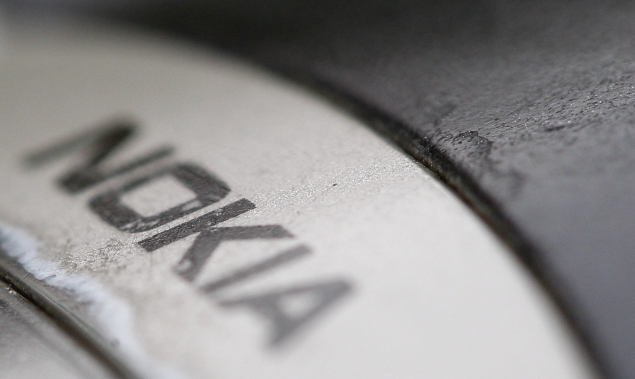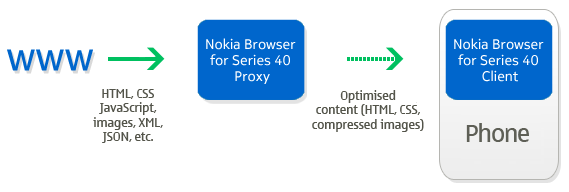Nokia's Xpress Browser draws criticism over the way it handles HTTPS data
By Kunal Dua | Updated: 11 January 2013 17:24 IST

Click Here to Add Gadgets360 As A Trusted Source

Advertisement
Nokia has been pushing its Xpress Browser, found in feature phones and the popular Asha series of phones, at every opportunity. The company claims the browser offers up to 90% savings in data costs by compressing data before transmission. Now, the browser is under criticism after the way it handles HTTPS traffic was brought to light.
Security blogger Gaurang K Pandya first wrote about the browser in December, highlighting that it was forcing traffic to go via Nokia's proxy server. No surprises there. All browsers which compress data - including Opera Mini and Amazon Silk - employ the same technique. In fact, Nokia's page linked above includes this nifty little image clearly depicting the same.

The outcry started when Pandya highlighted that Xpress Browser was routing secure HTTPS traffic via Nokia servers as well.
When you visit a website using your PC or mobile, the request is sent to the website's server, which responds with the data present on that page. The communication doesn't happen directly between your PC and the website's server, and the request as well as the response are sent via multiple intermediate servers.
Most traffic on the Web is sent over the insecure HTTP protocol (e.g. https://www.gadgets360.com), which means that it can be 'seen' by any one of these intermediaries. The HTTPS protocol (e.g. https://www.google.com) adds a secure layer on top of HTTP that mandates encryption of data exchanged between the two machines, which prevents any intermediaries from snooping in. Another important element of the HTTPS protocol are certificates, which are used to confirm the identity of machines. HTTPS is used for anything that requires secure communication, like transmitting credit card information or bank details.
Nokia's Xpress Browser, and indeed Opera Mini (which talks about the topic in detail in its FAQ) redirect all HTTP and HTTPS communication via their proxy servers. All your HTTPS requests are decrypted by their proxy, and re-encrypted before forwarding them to the secure site. The server's response is then intercepted by the proxy, decrypted and re-encrypted before sending back to the browser. The apps reportedly use pre-installed certificates to 'trick' the browser into trusting the data that is being sent by the proxy instead of the original site.
This means both Nokia and Opera can, at least theoretically, look at, and thus, store, your confidential data. Opera clearly mentions it does not collect any data in its FAQ. The terms of use of Nokia's browser weren't so clear, which sparked an outrage after Pandya shared his findings.
Nokia was forced to issued the following statement, clarifying it does not collect any data.
While that, along with Nokia's statement, should calm the nerves of most users, we believe a bit more time spent in educating users and having "sensible defaults" would go much farther in preventing such controversies from erupting in the future. Browsers like Amazon Silk leave HTTPS communication untouched even when they compress HTTP communication, and we believe that is a sensible way to go.
Security blogger Gaurang K Pandya first wrote about the browser in December, highlighting that it was forcing traffic to go via Nokia's proxy server. No surprises there. All browsers which compress data - including Opera Mini and Amazon Silk - employ the same technique. In fact, Nokia's page linked above includes this nifty little image clearly depicting the same.
The outcry started when Pandya highlighted that Xpress Browser was routing secure HTTPS traffic via Nokia servers as well.
When you visit a website using your PC or mobile, the request is sent to the website's server, which responds with the data present on that page. The communication doesn't happen directly between your PC and the website's server, and the request as well as the response are sent via multiple intermediate servers.
Most traffic on the Web is sent over the insecure HTTP protocol (e.g. https://www.gadgets360.com), which means that it can be 'seen' by any one of these intermediaries. The HTTPS protocol (e.g. https://www.google.com) adds a secure layer on top of HTTP that mandates encryption of data exchanged between the two machines, which prevents any intermediaries from snooping in. Another important element of the HTTPS protocol are certificates, which are used to confirm the identity of machines. HTTPS is used for anything that requires secure communication, like transmitting credit card information or bank details.
Nokia's Xpress Browser, and indeed Opera Mini (which talks about the topic in detail in its FAQ) redirect all HTTP and HTTPS communication via their proxy servers. All your HTTPS requests are decrypted by their proxy, and re-encrypted before forwarding them to the secure site. The server's response is then intercepted by the proxy, decrypted and re-encrypted before sending back to the browser. The apps reportedly use pre-installed certificates to 'trick' the browser into trusting the data that is being sent by the proxy instead of the original site.
This means both Nokia and Opera can, at least theoretically, look at, and thus, store, your confidential data. Opera clearly mentions it does not collect any data in its FAQ. The terms of use of Nokia's browser weren't so clear, which sparked an outrage after Pandya shared his findings.
Nokia was forced to issued the following statement, clarifying it does not collect any data.
We take the privacy and security of our consumers and their data very seriously. The compression that occurs within the Nokia Xpress Browser means that users can get faster web browsing and more value out of their data plans. Importantly, the proxy servers do not store the content of web pages visited by our users or any information they enter into them. When temporary decryption of HTTPS connections is required on our proxy servers, to transform and deliver users' content, it is done in a secure manner.Meanwhile, Pandya claims that Nokia has issued an update to its browser that means it is no longer decrypting the data on its servers, but the traffic is still flowing via its servers.
Nokia has implemented appropriate organizational and technical measures to prevent access to private information. Claims that we would access complete unencrypted information are inaccurate.
We aim to be completely transparent on privacy practices. As part of our policy of continuous improvement we will review the information provided in the mobile client in case this can be improved.
While that, along with Nokia's statement, should calm the nerves of most users, we believe a bit more time spent in educating users and having "sensible defaults" would go much farther in preventing such controversies from erupting in the future. Browsers like Amazon Silk leave HTTPS communication untouched even when they compress HTTP communication, and we believe that is a sensible way to go.
Amazon Silk routes secure (SSL) web page requests directly from your computer to origin servers so they do not pass through Amazon servers.Even if companies like Nokia and Opera want to offer the ability to compress HTTPS data as a genuine benefit to users, they should have it as an application preference that is turned off by default. The users should be told exactly what this option entails before they flip that switch on.
Affiliate links may be automatically generated - see our ethics statement for details.
Comments
Get your daily dose of tech news, reviews, and insights, in under 80 characters on Gadgets 360 Turbo. Connect with fellow tech lovers on our Forum. Follow us on X, Facebook, WhatsApp, Threads and Google News for instant updates. Catch all the action on our YouTube channel.
Related Stories
Popular on Gadgets
- Samsung Galaxy Unpacked 2026
- iPhone 17 Pro Max
- ChatGPT
- iOS 26
- Laptop Under 50000
- Smartwatch Under 10000
- Apple Vision Pro
- Oneplus 12
- OnePlus Nord CE 3 Lite 5G
- iPhone 13
- Xiaomi 14 Pro
- Oppo Find N3
- Tecno Spark Go (2023)
- Realme V30
- Best Phones Under 25000
- Samsung Galaxy S24 Series
- Cryptocurrency
- iQoo 12
- Samsung Galaxy S24 Ultra
- Giottus
- Samsung Galaxy Z Flip 5
- Apple 'Scary Fast'
- Housefull 5
- GoPro Hero 12 Black Review
- Invincible Season 2
- JioGlass
- HD Ready TV
- Latest Mobile Phones
- Compare Phones
Latest Gadgets
- Tecno Pova Curve 2 5G
- Lava Yuva Star 3
- Honor X6d
- OPPO K14x 5G
- Samsung Galaxy F70e 5G
- iQOO 15 Ultra
- OPPO A6v 5G
- OPPO A6i+ 5G
- Asus Vivobook 16 (M1605NAQ)
- Asus Vivobook 15 (2026)
- Brave Ark 2-in-1
- Black Shark Gaming Tablet
- boAt Chrome Iris
- HMD Watch P1
- Haier H5E Series
- Acerpure Nitro Z Series 100-inch QLED TV
- Asus ROG Ally
- Nintendo Switch Lite
- Haier 1.6 Ton 5 Star Inverter Split AC (HSU19G-MZAID5BN-INV)
- Haier 1.6 Ton 5 Star Inverter Split AC (HSU19G-MZAIM5BN-INV)
© Copyright Red Pixels Ventures Limited 2026. All rights reserved.







![[Partner Content] OPPO Reno15 Series: AI Portrait Camera, Popout and First Compact Reno](https://www.gadgets360.com/static/mobile/images/spacer.png)









